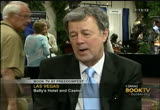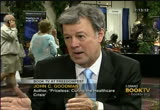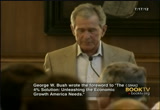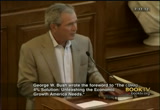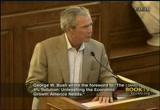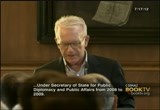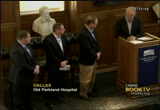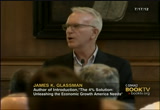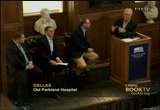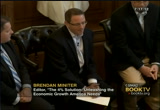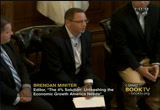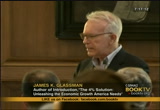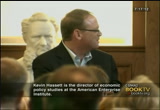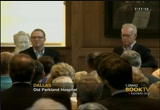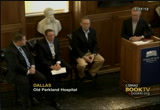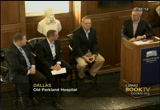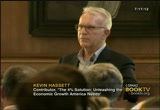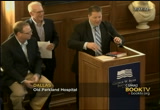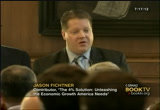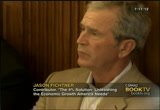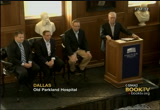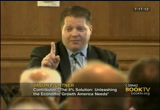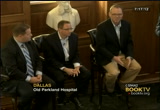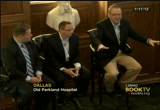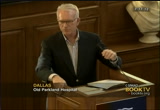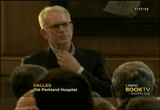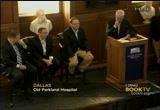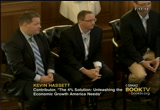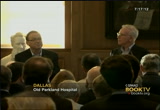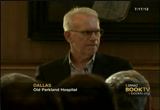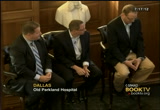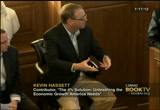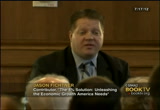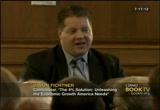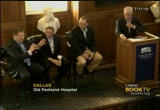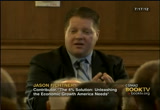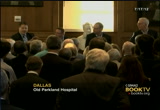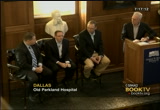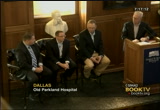tv Book TV CSPAN December 23, 2012 2:45pm-3:30pm EST
2:45 pm
>> host: what about insurance companies? what is their role in reforming the health care system? >> guest: right now they are big bureaucracies, that they need to be liberated to. we need real insurance. you have to against preexisting condition. you do that when you buy life insurance. then you get a prostate cancer test it turns out that for you. you'll pay a higher premium and health insurance should be the same way. >> host: people often compare health insurance policy to auto insurance policy. can they be the same or similar? >> guest: i wish they were because of the auto casualty insurance, you see commercials on tv saying is something that happens to you, will be there for you. in health care we get exactly the opposite. health insurers don't want anybody with the problem. they really have an incentive to wonder provided to you because they didn't want you in the first place and davis should go
2:46 pm
else. so we've given insurance companies that incentives to take care of us. >> host: john goodman, when it comes to preexisting conditions, does the government have the rule and saying you need to ensure preexisting conditions? >> guest: yes, but she don't want to join the premium below the cost of care because the insurance company isn't going to want you and is going to treat you poorly. so what we recommend is being able to ensure an advance against preexisting conditions so if you have to pay a higher premium on insurance that pays a higher premium. but also we need affordable insurance. we don't have it dandruff on the care. if you own your own insurance, take a job to job. >> host: the employer system, is it time to not be the system? >> guest: i believe in free markets. employers do what they need to do. but let's have a level playing
2:47 pm
field. once in every state make it illegal for the employer to buy for employees insurance they can take with them for the next job. we need to abolish laws, turn everything around and encourage affordable insurance. >> host: what is the argument in favor of having it divided by states? >> guest: i can't think of any argument i find persuasive. you want to buy insurance across state lines. so this is just silliness. the only people to benefit our special interest to pack into your health insurance plan, their special coverage is and that's not benefiting here. it's benefiting special interests. >> host: "priceless: curing the healthcare crisis," the new book in 2012 and john goodman is the author. this is booktv on c-span 2.
2:48 pm
>> they are just necessary to restore economic health. president george w. bush who wrote the forward to the book makes opening remarks. this is about 45 minutes. [cheers and applause] >> thank you all for coming. so when we have an event like this a year from now, as nice as harlan's operation is, i think would be a place you really like on the smu campus. thank you for your house italic t. it's a pretty good interim step. i want to thank a soldier turner at smu, president of the united states. with the bush center -- the provost and vice president are here with their spouses. were fortunate to be associated
2:49 pm
with smu. our relationship has exceeded our expectations. i hope we've exceeded yours. we are very much involved in action oriented programs. want to be known as the thing tank. i want to be known as an action oriented place that can make a difference in the world. i want to thank you all for having faith in us when we first convince you to support the bush center on the smu campus. laura and i just got back from a boy, and the nba. we went over there because at the bush center, one of her major initiatives is to honor human life. we believe all life is precious, whether they live in america for the continent of africa were disturbed by the fact that many women who have hiv/aids -- hiv
2:50 pm
virus are getting cervical cancer and not much is being done about it. so with your help could whip together together a collaborative effort to save lives. part of the mission was to kick off what we call pink ribbon, red pregnant in botswana as well as follow up in zambia where we kicked it off in december. laura and i also liked to go on refurbish a clinic. i wanted it to be a matter doesn't matter what your status is in life, you're never too proud to handily pay rush. ended up with more paint on me than the wall. last night so we went over to a clinic and i wish you could've seen the faces of the ladies who showed up at this refurbish clinic to be screened for cervical cancer. 150 women have now been screened since we opened it up.
2:51 pm
20% of whom had cancers, legions, most of whom were treated right there at the clinic. the reason i tell you the story is that the bush center is involved with saving lives and therefore you are as well and i hope it makes or hurts so good. it makes a difference to people he'll never know. but know that their lives have been changed immeasurably. secondly, we believe we can do better in growing our economy. and so, jim glassman will come up and introduced the panelists in a second, who is the founder, executive director of the bush institute, the action oriented place on the smu campus. and i as well as amity chalets
2:52 pm
and others decided we would assemble the finest minds in the country who share the sense of a system we have better private sector can grow at 4% asleep at the the right policies in place. my views will never fix the deficit soccer in the dirt. [applause] so therefore you shouldn't take my word for it. you should take the word for the people who are experts on the economy. and here's our product. you are the first to see it. so we published a book, "the 4% solution." jim is going to introduce many of the folks who are here who have written some of the chap verse. and then brendan miniter come in the very able editor at the bush summer will be conduct in the panel. if you please welcome jim glassman, founding executive director of the george w. bush institute and has led us nobly
2:53 pm
in her first 18 months of existence. for practice have you here. it's for coming. [applause] >> thank you, president bush. panelists may. president bush talk to you about what we are doing in africa. one of the waste to sum up what the bush institute does is advancing freedom. you can't be free if you're sick. he can't be free either if you live in a society ruled that the gators as the people of our brand or syria or cuba do. but the freedom collection to wish it dissidents and freedom advocates the way. we for young minds of education programs. were helping to build the free institutions of the middle east with women's fellowship since it will help wounded warriors and
2:54 pm
other veterans and their families through military service initiative. today is the president said this about economic freedom, which is the surest route to growth. as president bush wrote in his forward to 4% solution, free-market capitalism offers the most efficient and just way to order an economy. such a system allows individuals to decide the course of their alliance. this book does not exist in a vacuum. side of the 4% growth product had eight in nitish lays. the product began at smu in the spring of 2011. i know many of you were there. the hard top economists and started a website. we held a second conference on tax policy in may in new york and we have an event scheduled in september in chicago that will feature governor mitch daniels. like the project as a whole,
2:55 pm
this book seeks americans as our economic problems as a way to advance opportunity and prosperity. we are currently growing at 2%. that's not good enough. this book offers free ticket to 4%. if we get to 4%, unemployment will plummet and so with the burden of debt. we hope this book will become the focus of discussion about the economy during the election campaign and beyond. it's about growth and freedom. today we have a short discussion appear among three contributors to the book. i want to introduce my good friend and former colleague, kevin hassett, american enterprise institute, formerly senior economist at the fed. he read a great chapter on the path to growth, focusing on spending, taxes and certainty. next come on the far end, jason fichtner, senior research fellow at the mercator center at george
2:56 pm
mason university and former chief economist of deputy commissioner during president bush's term of the social security administration. and he wrote a superb chapter on how social security should be reformed to encourage growth. finally, as president bush, our editorial friend, brendan miniter who edited this book. i want the opportunity to thank contributors to the book who are here today. additional contributors who aren't on the panel. raise your hand -- she read about immigration. richard palm of smu and michael cox of smu are both here. and as you can see, smu is very important. in fact, maria and meaty who is here today also a chapter for
2:57 pm
the book and it's very important to the bush center. this is the bush institute's first book, the first of many as you will soon see. it is unusual that is published by by a major trade publisher, crown. as a result with a broad circulation. many of you here are supporters of the bush center and the thank all of you for making this book possible and in a real sense, this book is literally yours and you will get a copy of this book as you leave, a signed copy by president bush. we'll also take questions from the floor. he is comfortable here? i like you better sitting. i do, i do. so brand and company did the impossible, to kind of franco as we say in texas by 21 authors, i'm not talking about kevin or jason, but temperamental types.
2:58 pm
tell us a story about getting these people to write for us. >> sure, this past fall president bush noted the boat and said we had for a noble authors of the book. so i was in the audience and said to myself, i better check on those guys can make sure all of them come through. the first when i reached out to his robert lucas. robert lucas is a brilliant guy. and he says, you know, i'm not 100% sure i can fill this. i said i better go get myself an insurance policy. cipro should burn a bird and a sense and i said vernon, which read a chapter for us? i pitched the chapter two of and he came back said no. some thinking to myself this is a promising. i may have to go back to the president and say we've got a little ahead sayer. then comes back to me and says
2:59 pm
come you know, there's a chapter a break to read. not the one you mentioned. i've been studying the housing crisis and have been looking at the great depression to what i find his house in his letter recession except for two. and under the rear session is in decatur in both the coming recession from, severity perception as well as to recovery. the two exceptions to his research. one was shortly after world war ii when it was a very mild recession and the other was in 2001. i said that's interesting. he goes a little further and said the exception of 2001 helped us understand to fascinate a little bit because housing didn't decline dramatically as you would expect in 2001.
3:00 pm
it actually powered through the recession. i've always thought later was what became the bubble. i said wow, that's a really good chapter. so he came through with it. i thought it was a great addition to the boat. after a comes rolling in, robert lucas said here's my chapter after all. i say this worked out pretty well. i go back to the president and say in fact he didn't have four, we got five. >> this book is unusual in that it has five nobel prize winners among us 21 authors. ..
3:01 pm
>> if you want to mess with washington, d.c., go ahead. that's absolutely fine. but -- [laughter] but i've been living in washington, d.c. for a long time and watching policy debates go on. and i've never seen a president that was as down in the weeds secretly as president bush is. and i just wanted to start with a little anecdote that, actually, i think the 4% solution was visible back then, but way long, long ago in the early years of president bush's administration, he called a bunch of nobel prize-winning economists into the white house to meet x it was my very first time seeing president bush, and i think it was the roosevelt room, it might have been. and i was very nervous, of course, and i wondered what the heck am i doing amongst all these great economistses, and then i wondered what president bush was like.
3:02 pm
and right at the beginning of the meeting he started requesting questions that had been bugging him about moral hazard of very technological issue. when he came up to washington, he was a policy wonk too. and that's why the bush institute, i think, has been founded, because president bush has had a curiosity about economics throughout his life x it's benefited us all. basically, what we have to do is just stop doing the wrong things, and there are three things in my chapter that i talk about that we could do to really turn the country around. the first is to get tax policy right, we're not doing it. right now we're the highest corporate tax country in the developed world, we're the third highest on earth. there are two countries that are less friendly for new businesses than the u.s. on earth, that's guyana and the congo. [laughter] but after those two, you know, we're the least friendly place. and i summarize in the chapter a
3:03 pm
bunch of research that shows if we could just sort of fix the stupid things that we're doing, then you could add about a percent of growth to gdp growth over the next decade, and we're probably starting around 2-3. and then the second thing is right now we owe a huge amount to foreigners and are running massive deficits bigger than a trig dollars a year. if you want to -- trillion dollars a year. you probably have in your mind some idea about what goth -- government does, right? government is the parts and the defense and the people stamping offices, and everything you think of government does if we were to set it to zero right now, we would still have a deficit right now. that's how much the government is suggestion sucking out of the -- just sucking out of the economy. so what we need is spending reform that really pares back government, and as the literature i cite in my chapter shows contrary to what keynes said, if you're in a situation like we are where you've got unsustainably high government
3:04 pm
spending, that if you pare it back, you can get a lot of growth sometimes relatively quickly, and i think there is about another half a percent to a percent if we could just have what economists call fiscal consolidation. sadly, there are a lot of countries throughout history that have opinion as messed up as we are, and we've seen them fixing by cutting. and the third thing we need to do is stop having everything expire in december. we've got this thing coming, right? imagine you're a business person, and you've got to decide what are you going to do next year? should you add a new factory? you know, should you hire a bunch of new workers? well, you don't know what the rules are going to be, right? and if you could just fix those rules kind of permanently so people could look at them and say, oh, that's what the rules are going to be, we know that would unleash a lot of pent-up activity. steve davis just published a paper out of the university of chicago that shows last year by
3:05 pm
his estimate economic uncertainty was the highest it'd ever been in the u.s. he claim up with a very clever measure to measure uncertainty, and according to last year gdp growth was a percent and a half lower because of all the uncertainty about the things with the fiscal cliff and the debt limit and so on. so that's a percent and a and a. we have got a percent out of taxes, half a percent to a percent out of fiscal consolidation and a percent and a half out of certainty. if you do it all at once, you probably won't get the high-end number. but i am very on optimistic thaf we just get ahead of the curve on these problems, that we can have the country we remember. thank you. >> thank you. i want to turn o jason. he -- turn to jason. we all know that in a financial
3:06 pm
sense and medicare are in trouble, but what we asked can him and charles blah house to do was how do you reform the social security system so it's not just fixing it in terms of making it balanced, but what do you do to get growth? what's the answer to that question? >> i have two hours, right? >> two minutes. [laughter] >> first of all, i want to thank everyone involved in this project. and, mr. president, thank you -- >> jason, why don't you sit here, because we're getting a little -- >> feedback? >> reverb, yeah. >> go ahead and turn your mic off. >> this better? thank you again, mr. president, for your remarks, and also i apologize i didn't get the no-tie memo today, but that's art all right, i look the fanciest up here. >> you can take it off. >> it doesn't come off. [laughter] retirement security is a passion of mine, and that literally
3:07 pm
means for some those who are young going to be old and those who are old today. and a lot of times people get social security, and they realize they think that's their savings plan, and that is actually a false assumption. one, the money going into the trust funds is being used for government spending, not for productive capital purposes. people actually think they have an account with their name on it and that they actually own that account, and that's not true. one of the initiatives president bush tried to put forward was private accounts, and i think we need to put that back on the table for discussion. we're looking at a very low savings rate. reports came out yesterday about how consumption has done gone down, and the savings rate ticked up to somewhere in the mid threes. that's still horrible. we are borrowing too much money. and the social security system has perverse incentives that, unfortunately, discourage work. and you're never going to grow the economy 2% a year, 3% a year, not even 4% a year if we do things that discourage work
3:08 pm
amongst our economy. the social security system encourages people to retire at 63. we penalize them by continuing to tax them past 62 and a negative return on their investment if you think about it in the social security system. we have a system right now that basically penalizes second-earner couples in the social security system. so we need to figure out ways, one of the things we write about in the book is allow -- how to change those incentives so they at least are work neutral. right now we are discouraging work, and that's holding this economy back from actually growing. one of the things we could do would be raise the retirement age. we could change the tax structures that people who start working when they're past 62, they don't pay payroll taxes into the system, so we don't have tax them. we have the retirement earnings test. when people want to work and are collecting benefits past 62, we tax them. why would you want to get taxed on them? so people don't work. you need to change that.
3:09 pm
i don't have any kids, so i'm not looking for a child tax credit break, but one of the things you see with countries is those who don't produce enough children end up stagnating and die. and if we go back to a post-world war ii sort of steady growth rate of fertility, we wouldn't have a social security trust fund problem right now. so one of the things we're looking at in the chapter is how do we change the tax system on the payroll tax side to incentivize those of who have dependent children under the age of 18. they would l still pay the same sort of lifetime tax benefit and burden over time, but to make that burden smaller actually trying to raise children. so it's a pro-family, pro-work reform. and these are all things we have to consider going forward. and the last thing is, too, looking back at private accounts. we need to return to this idea that people need to save and put that money to capital use. without capital investment, without personal savings and personal responsibility for
3:10 pm
savings, we're not going to hit 4% growth. so we really look at how we would actually do that today. >> thank you. >> go ahead. >> so let me just open the floor up to questions, we've got a bunch of brainy people up here. they genuinely do a good job of explaining stuff. so, yes, sir. yeah, wait for the microphone. >> dr. john deally, and i love action. >> i'm sorry, can't hear -- it's a little bit too close. >> is this better? >> yeah. >> okay. dr. john deally, and i love action. >> good. >> i'd like to ask each one of of our panelists what is one thing that the people here tonight can do before we go to tomorrow -- before we go to bed tomorrow night to move us toward president bush's dreams which are talked about in the book. >> okay. what is the one thing people here in this room can do before they go to bed tonight to
3:11 pm
advance us toward president bush's dream, our dream of 4% growth? >> [inaudible] >> yes, sir. >> i don't mean it to be glib. buy two copies of the book. keep one and give one to your neighbor. [laughter] [applause] >> there you go. >> i don't mean this to be glib, but one of the things we are not having in this country is a concerted, real dialogue and discourse about the problems we have. we really need to have a discussion. you're not getting out of washington today. you're getting left/right politics going back and forth, the media's not helping. we need to actually share information that is real, trusted and honest so we can start or having those kitchen table conversations again. only by actually getting real numbers out in the discussion do we start influencing the debate. that's one small step you could do. >> that's fabulous, and i love that, but i want to ask for an amendment also because 90% of the books that are bought are never read. so can you give us a three-page
3:12 pm
e-mail that we can send to our friends that give a summary of the book? now, i understand it won't do the whole job -- >> we have it. we have one already done. >> okay. let me just ask all of you, because i know we're having some mic problems, can people in the back hear when jason talks? you can? okay, fine. >> all right. >> not very well? >> here's what i'm going to do, i'm going to bring everybody up here. we're going to get really cozy. oh, you've got another mic? maybe it's his microphone. >> is it my mic? it might have been too low. >> kevin, you know, i think that the read the book point is correct, but the reason why the book is so effective is that the stuff makes sense. so you're just listening to jason. when you read the chapters, just as we were talking about dealing with economists, you know, brendan put a lot of work in to force people to be understandable. it's a lot of work. but what happens is when you go
3:13 pm
through the chapters, you start to understand why we're in the mess we're in and what we need to do to fix it, and it makes perfect sense. and, you know, participant -- part of it was what jason was saying, but what i learned was this: if i don't eat something or don't buy a new car this year, put money in the bank, then next year i've got some money in the bank. if i'm sort of careful about what i consume, then in a few years i've got lots of money in the bank, and if i start using that interest, i have a higher level of consumption than i would have if i'd been consuming all along. a few years down the road i have the wherewithal to buy more stuff. well, the same is true with the united states of america, and we've not been doing that at all. we've been borrowing and spreading the wealth around and feeding a consumption binge, and we haven't accumulated the assets we need to create future consumption and create growth. and so what we need to do, and this was evident in president
3:14 pm
bush's speeches early in the 2000s, we need to create an environment that's friendly to business and capital so that businesses and capital come here, and then we'll have more in the future, and we can grow our consumption, and we can grow our well being. we can have 4% growth. but the reason why you need to read the book is that it makes sense, and we all need to become advocates for doing the sense bl thing. because the sensible thing is the last thing people in washington are talking about right now. [laughter] >> and i think there are four chapters in the book that sort of sum it up; president bush's forward, my introduction, brendan's chapter on why growth, and kevin's chapter, chapter 6, which presents three or or four, as he just outlined, quick ways to growth. maybe that's the best answer to your question. other questions? >> actually, could i just follow on that for a second? >> sure. >> one of the goals we have in this book is to change the conversation to growth. we have this debate between austerity and growth. growth really matters, okay? if you're growing, all right?
3:15 pm
to get the economy growing, people want to prosper, it makes solving these other problems a lot easier to do. so we have, yes, what we can do is we have to absorb the fact that growth matters. and if you start thinking about growing versus just cutting or just austerity, i think it's important, i point that out in my chapter. but growth is, ultimately, the target. we have to grow, we have to grow the economy. >> so there are other questions? do i see another question? yes, sir. >> [inaudible] >> okay. >> if, god forbid, we get obama for four or more years -- [laughter] what would you suggest that we promote as -- [inaudible] >> president bush is, has been really add publishly nonpartisan, and i think he's --
3:16 pm
>> [inaudible] >> i agree. and i have to say he focuses very much on substance. and the one thing that i can say is that if you focus enough on substance, then you can convince anybody because the arguments are so sensible. and i think our objective as policymakers and as think tankers and do tankers, whatever we're going to call ourselves, is to make convincing arguments. because there have been times when convincing arguments have won regardless of who's in the white house. and i think the fact is that unemployment is so high right now that, you know, we're really desperate for good ideas. and i've got say that if you looked, the new york times gave this book a kind of rave review. now, i know "the new york times" is famous for being in the tank for president bush -- [laughter] but i think that they probably did that because they recognize the gravity of our current circumstances, and they as well as we are hungry for ideas that'll work because we've seen things that don't. and i can't imagine a patriot not having that attitude regardless of who wins in
3:17 pm
november. >> [inaudible] >> yes, sir. >> if obama is reelected, what are your percentage chances that the u.s. will eventually end up like greece? >> well, look, if i could just answer that, i'm an optimist on america. i believe in america. i'd buy it, you know, if america was a publicly-traded company, i'd buy the stock every day. this country and this economy is tremendously resilient. and one of the great things, i think, about our book is it's got ideas that require action in washington, it's also at state level, individual level and there's some business and corporate level. so, you know, what are the odds? i would, you know, i'm an on the optimist. i would say we will get back to growth. >> kevin? >> the oecd, which is an organization that studies large, developed nations just did a big study to try to identify how big
3:18 pm
the policy challenges facing the nations around the world are. and they estimated something called the fiscal adjustment, and the fiscal adjustment for greece that they need -- which is either the immediate tax increase or the immediate reduction in spending necessary to make it so that their economy doesn't just explode is about 3% of gdp. which is a pretty big adjustment. they'd have to increase their taxes by 3% of gdp to fix their problem or cut spending by that. the oecd estimate for the united states is we would have to have a fiscal adjustment of 8%. our policies are far worse than greece. if somebody says, you know, i think we're kind of like greece, then my answer is n my dreams, okay? [laughter] our situation is actually far worse. we promised much bigger benefits than we can afford, and we don't have a plan to pay for them. and we're going to have to make big changes, and i don't know if we're going to make the big changes this year, or if we're going to have a crisis like
3:19 pm
greece is having. but there's a big benefit to getting out ahead of it, and that's sort of like the optimist answer. because we're in worst shape that be -- worse shape than greece, then the policy opportunity is unprecedented. we can grow 4%. >> [inaudible] [laughter] >> well, i can understand that from kevin because he's an economists. >> yeah. >> yes. ken. oh, okay. we're going to get, get the doctor a microphone, and in the meantime, is there another microphone anywhere? we'll just wait. >> thank you very much. can you hear me? >> yes. >> do i, since we're action-oriented, do you have, any of you, concrete ideas that can resolve the problem between the dilemma that on the one hand if you cut the taxes, you're really cutting jobs -- i'm sorry, the be -- yeah, if you
3:20 pm
cut the taxes, you're cutting -- i'm saying it wrong. >> if you cut the spending. >> pardon? >> you're saying you cut the spending? >> you cut the spending, that's right. you cut the spending, it means you're cutting jobs. if you keep on spending, ultimately we go bankrupt. so we need something concrete to see about that rather than, you know, we need to grow or things like that. >> okay, good question. i'll just repeat the question. he said how do you resolve the paradox or the conflict between people who say that if you cut spending, if you cut government spending, you're going to cut jobs, but if you don't cut government spending, you're going to increase deficits and debt? now, i hate to have kevin dominate this, but kevin's chapter actually goes into this in, i think, a very interesting way. so you want to answer the question and then jason? >> yeah. so there are two answers. one is that cutting spending isn't always bad for the economy
3:21 pm
if you're eliminating government jobs. it's not just necessarily that. for example, does anyone know that in the last three years the federal government in the u.s. has added 35,000 regulators? they've hired 35,000 new regulators, more than they had when president obama took office. i'm not, i don't think those regulators are necessarily good for the economy on net. and so there's that. but the real answer is just that you have to change the long-term growth of entitlements. that's the big problem. and, you know, jason's got a great chapter on how to do that. and if you do that, then you're not necessarily causing a big radical reduction in government spending this year. what you're doing is you're making it so ten years from now it's way, way lower than we currently expect, but we know we can pay for it. so you're reducing future benefits in a way that people can see. now, the point is just this. actually, jason, i wonder if it's true, kids more of them believe in extraterrestrials than believe they'll get their social security. >> right. >> and so if we change their
3:22 pm
benefits, then they don't actually think they're worse off, right? so right now we're promising them a benefit they know they can't get. if we promise them a benefit they know they'll actually get, you're not going to create the negative spending effect that the keynesians talk about. >> and i would add to that, there's a great parable in the book, and i apologize, i can't remember which author wrote it, but it was about the u.s. engineer who went to china and saw them building a dam. and china's o so interested in having jobs and job creation. and the u.s. engineer goes to china, and he sees them building a dam, and they're all using shovels. and the engineer asks the chinese engineer, why are they using shovels? why don't you have them use modern equipment? we're trying to create jobs. and so the british -- engineer says why don't you give them spoons? [laughter] all jobs are not the same. the idea that we somehow reduce spending or even if we reduce
3:23 pm
the growth of government spending which would be an important first step does not mean we're going to see retardation in growth levels. those people who actually do capital investment. so i've been arguing as kevin said on entitlement reform. the federal government spent $3.5 trillion last year. of that about 1.5 was social security, medicare and medicaid. three big government expenditure programs are about 45% of government expenditures. those are growing. in 2010 medicare and medicaid combined spent more than social security. social security is a $750 billion program. it's growing. health care, medicare, medicaid, it's growing. if we don't do something to rein those programs back in and change the incentive structures to get more pro-market, growth-oriented policies in place, we are going to hit a fiscal cliff not at the end of in this year. we're lucky right now that our interest rates are so low.
3:24 pm
it's not because people love to come here, it's because we're not the ugliest person at the beauty pageant. they tonight want to put their money in greece, spain or portugal, so they're putting it here. our interest rates are so low. that's not going to last forever. be you go back up to a long-term average of 6-8%, we add a trillion dollars in debt service and cost interests over ten years. the interest alone will swallow up half of our federal expenditures. we'll be paying china for their military. we can't allow this to happen. and i think that's one of the reasons why we're so proud to do this book, is we really are putting policies in place and gentlemen, regardless of who's president in january 2013, they're going to face the exact same problems we have today. somebody has to tackle it, and part of what this action-oriented institute is doing, this book is doing is putting those ideas out there so we can start having a discussion about, one, the importance is real, we're here today, and here's how you get reform in place with pro-growth policies. we've talked about the idea of
3:25 pm
greece and their debt crisis, economic studies have looked back over history about when do countries hit the tipping point on their debt to gdp ratio, and generally the idea on gross debt when you hit 90% debt to gdp, you start seeing a retardation in growth. you're definitely going to slow your growth. right now we're at 100% debt to gdp. our g in, p is up 15 trillion, and it's climbing. we are seeing a reduction in our growth potential because of our debt. and one of the things, you know, we worked these chapters blind. we didn't see these chapters until they were done. there was a uniform sort of concept throughout most of the chapters that we need to get our debt in order and reduce the debt and deficit. we need to have savings, more savings in this country that encourage investment, and we need to encourage labor participation and work. that's a uniform theme, and these policies need to be put in place regardless who's president in january, or we're all going to face more difficult problems going forward.
3:26 pm
>> i'll take one more question. there was somebody here. yeah. >> i think you hit the nail on the head. we're spending roughly a trillion and a half more every year federally than we bring in. my question is, let's say by some miracle romney actually wins the election. will there be the political will to come by nation effectively reduce spending and raise taxes to the point we can effectively reduce that, and that's in light of historically low interest rates, that, you know, at some point are going to go up, and china's going to realize our debt's no good. i'd be interested in each of the panelists' comment. >> quickly, is there political will? >> i think the answer is, yes. right now as kevin mentioned, we have the highest corporate tax rate in the oecd, 35%. president obama and governor mitt romney have both come out advocating for reduction of the corporate rate to something that
3:27 pm
starts with a 2. president obama says 28, mitt romney says 25. if lowering marginal tax rates is good for corporations because of the incentive effect, aren't they good for individuals because of the incentive effect? because there's a commonality on the corporate rate, we might see something happen in 2013 regardless of who's elected. that's a wedge to start having a discussion on tax reform in general. and you mentioned the $1.5 trillion sort of deficit each year. for those new york times columnists who think that the stimulus bill we put forward wasn't big enough, $1.5 trillion extra spending a year, isn't that stimulus right there? how has that worked for us? >> you know, in any discussion about economic you quickly get to a chart, and we didn't treat any of you to a wonderful chart tonight. but i will mention one in answering this political will question. we had, you know, we had robert lucas do a chapter, and he had a
3:28 pm
very fascinating chart. he put on a line that says, you know, here's average gdp growth in the united states, and you could run this line back almost 100 years, it's about 3%. sometimes it's less, and sometimes it's more. after recession it's usually much more so it can catch up to its average around 3%. and he said, you know, something's very interesting. you look at the recession since 2008, and it has taken a step down, and then it started to grow at a lower trajectory. so we never caught back up to where we should have been. and not only that, we're on a lower trajectory. so over time we're going to get further and further from where we should be and where we could be. and another one of our chapter authors, ed prescott, looked at that and said, you know, this is not too dissimilar from where europe was in the early 1970s. europe grew at about our rate after world war ii. we were pretty much in line until the early to mid '70s, and then all of a sudden they took a significant step down and
3:29 pm
never caught back up. and they were on a lower growth trajectory. they had taken a ten down and were on a lowerrer growth trajectory. so year after year after year that gulf between us and europe got wider. it's now about 40%. that's a pretty significant gap. we're looking at, you know, just to get back to lucas' chart, we're looking at the beginning of that for us. and we say if we don't get back to ha growth, we could look at -- to that growth, we could look at europe and say that's our future. and since we have the ability to look at what's happening around the world, we can say that's not the future we want. and nothing concentrates the mind like a crisis. or like people being unemployed. i would say 8% unemployment is a crisis in this country. and, you know, i think what you'll see in washington after the politics is done in november is that there will be a consensus on getting back to growth and getting back to the policies that we know will put americans back to
154 Views
IN COLLECTIONS
CSPAN2 Television Archive
Television Archive  Television Archive News Search Service
Television Archive News Search Service 
Uploaded by TV Archive on

 Live Music Archive
Live Music Archive Librivox Free Audio
Librivox Free Audio Metropolitan Museum
Metropolitan Museum Cleveland Museum of Art
Cleveland Museum of Art Internet Arcade
Internet Arcade Console Living Room
Console Living Room Books to Borrow
Books to Borrow Open Library
Open Library TV News
TV News Understanding 9/11
Understanding 9/11